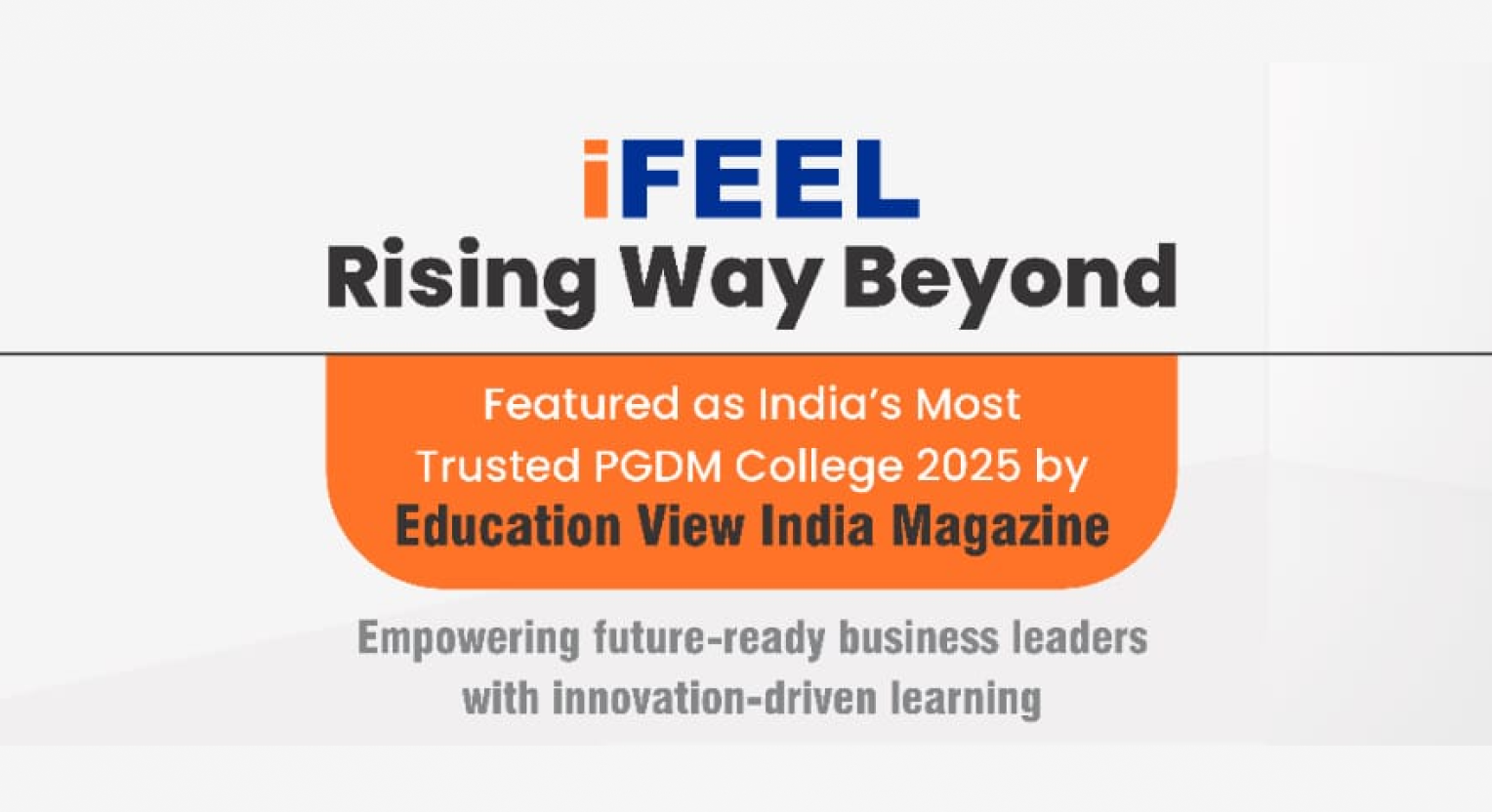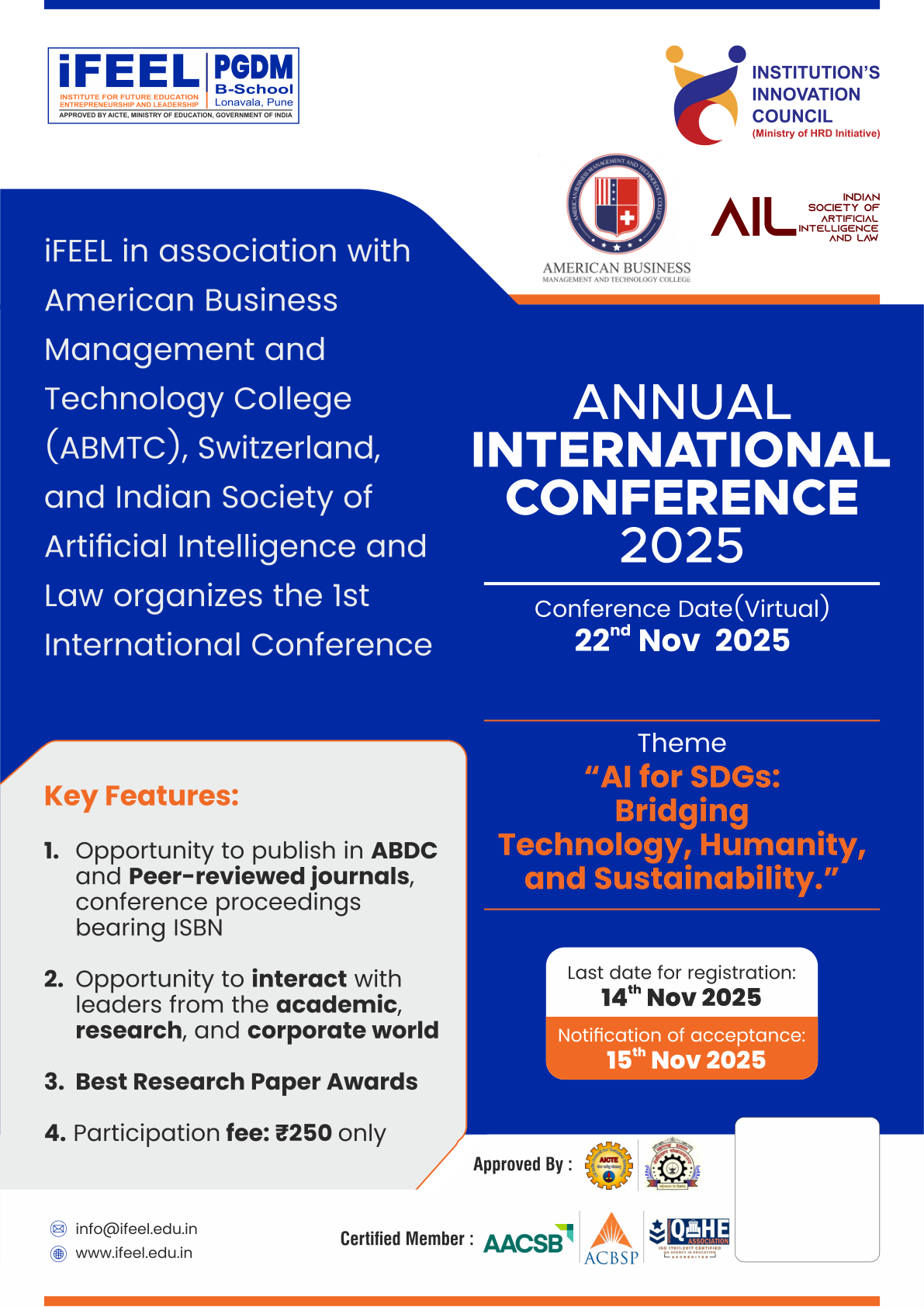
INSTITUTION’S
INNOVATION
COUNCIL
(Ministry
of
HRD
Initiative)
INDIAN
SOCIETY
OF
ARTIFICIAL
INTELLIGE?
"AND,
NCE
LAW
iFEEL
in
association
with
;
AMERICAN
BUSINESS
American
Business
Management
and
Technology
College
ANNUAL
(ABMTC),
Switzerland,
INTERNATIONAL
and
Indian
Society
of
CONFERENCE
Artificial
Intelligence
and
2025
Law
organizes
the
Ist
Conference
Date(virtual)
International
Conference
22"
Nov
2025
Theme
Key
Features:
Opportunity
to
publish
in
ABDC
and
Peer-reviewed
journals,
conference
proceedings
bearing
ISBN
.
Opportunity
to
interact
with
leaders
from
the
academic,
14"
Nov
2025
research,
and
corporate
world
Notification
of
acceptance:
15"
Nov
2025
3.
Best
Research
Paper
Awards
4.
Participation
fee:
250
only
—
Approved
By
:
i
®)
info@ifeel.edu.in
Certified
Member
:
AACSB"
rN
4
OSH}
®
www.ifeel.eduin
ACBSP
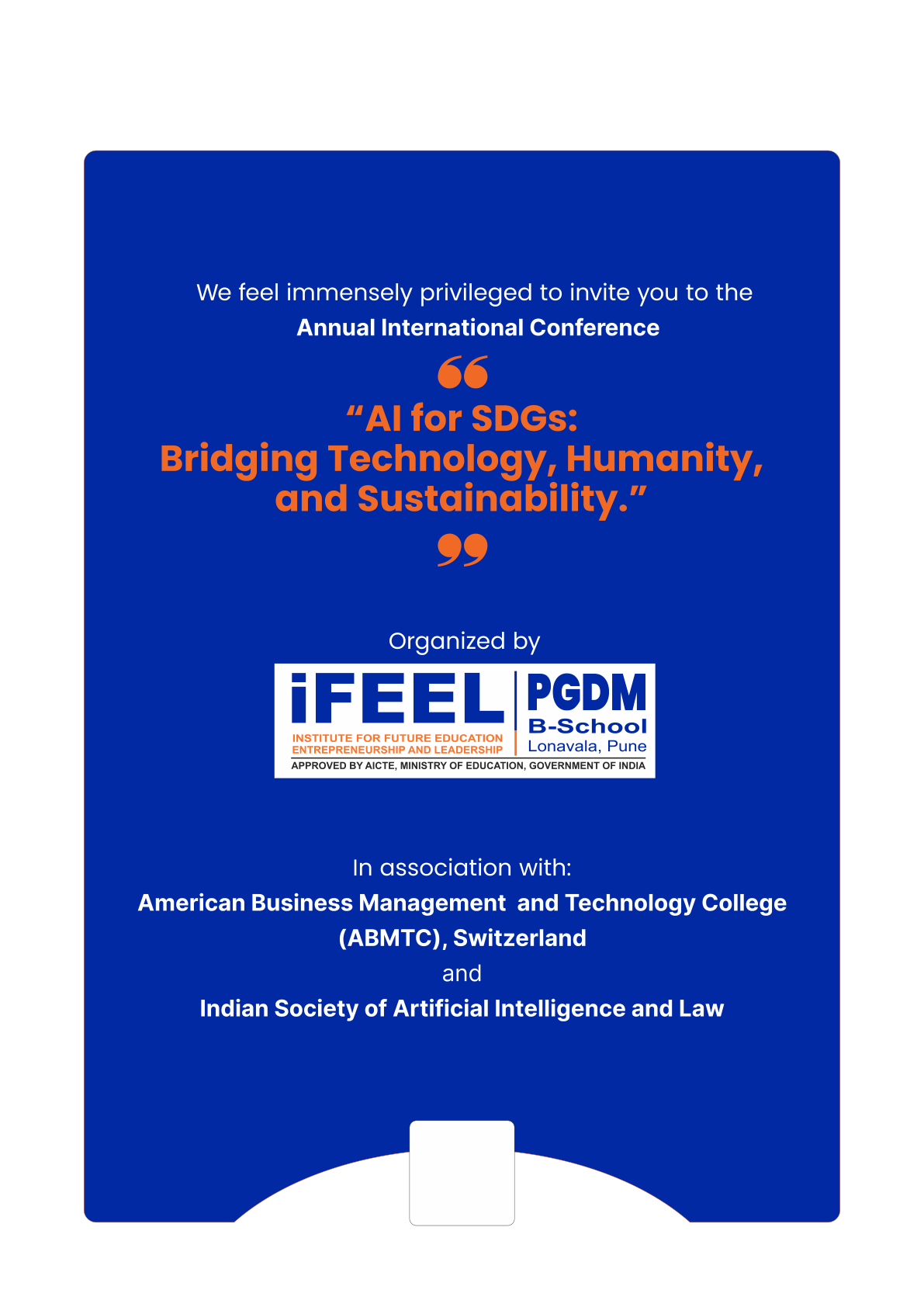
We
feel
immensely
privileged
to
invite
you
to
the
Annual
International
Conference
Organized
by
iIFEEL/PcbM
B-School
INSTITUTE
FOR
FUTURE
EDUCATION
ENTREPRENEURSHIP
AND
LEADERSHIP_
|
Lonavala,
Pune
[APPROVED
BY
AICTE,
MINISTRY
OF
EDUCATION,
GOVERNMENT
OF
INDIA
In
association
with:
American
Business
Management
and
Technology
College
(ABMTC),
Switzerland
and
Indian
Society
of
Artificial
Intelligence
and
Law
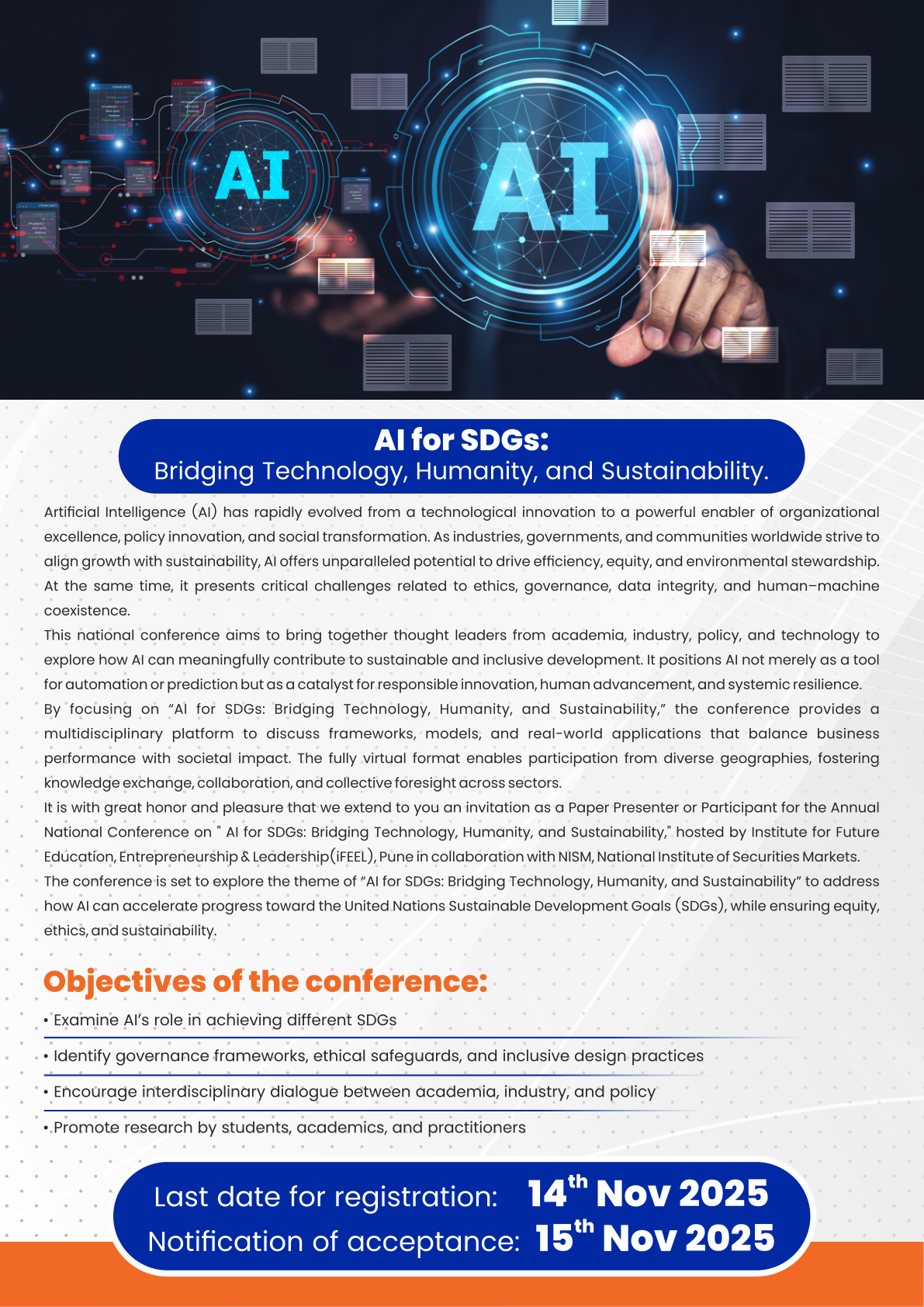
Artificial
Intelligence
(Al)
has
rapidly
evolved
from
a
technological
innovation
to
a
powerful
enabler
of
organizational
excellence,
policy
innovation,
and
social
transformation.
As
industries,
governments,
and
communities
worldwide
strive
to
align
growth
with
sustainability,
Al
offers
unparalleled
potential
to
drive
efficiency,
equity,
and
environmental
stewardship.
At
the
same
time,
it
presents
critical
challenges
related
to
ethics,
governance,
data
integrity,
and
human-machine
coexistence.
This
national
conference
aims
to
bring
together
thought
leaders
from
academia,
industry,
policy,
and
technology
to
explore
how
Al
can
meaningfully
contribute
to
sustainable
and
inclusive
development.
It
positions
Al
not
merely
as
a
tool
for
automation
or
prediction
but
as
a
catalyst
for
responsible
innovation,
human
advancement,
and
systemic
resilience.
By
focusing
on
“Al
for
SDGs:
Bridging
Technology,
Humanity,
and
Sustainability,”
the
conference
provides
a
multidisciplinary
platform
to
discuss
frameworks,
models,
and
real-world
applications
that
balance
business
performance
with
societal
impact.
The
fully
virtual
format
enables
participation
from
diverse
geographies,
fostering
knowledge
exchange,
collaboration,
and
collective
foresight
across
sectors.
It
is
with
great
honor
and
pleasure
that
we
extend
to
you
an
invitation
as
a
Paper
Presenter
or
Participant
for
the
Annual
National
Conference
on
"
Al
for
SDGs:
Bridging
Technology,
Humanity,
and
Sustainability,”
hosted
by
Institute
for
Future
Education,
Entrepreneurship
&
Leadership(iFEEL),
Pune
in
collaboration
with
NISM,
National
Institute
of
Securities
Markets.
The
conference
is
set
to
explore
the
theme
of
“Al
for
SDGs:
Bridging
Technology,
Humanity,
and
Sustainability”
to
address
how
Alcan
accelerate
progress
toward
the
United
Nations
Sustainable
Development
Goals
(SDGs),
while
ensuring
equity,
ethics,
and
sustainability.
e
©.
.
Objectives
of
the
conference:
*
Examine
Al's
role
in
achieving
different
SDGs
+
Identify
governance
frameworks,
ethical
safeguards,
and
inclusive
design
practices
+
Encourage
interdisciplinary
dialogue
between
academia,
industry,
and
policy
+.Promote
research
by
students,
academics,
and
practitioners
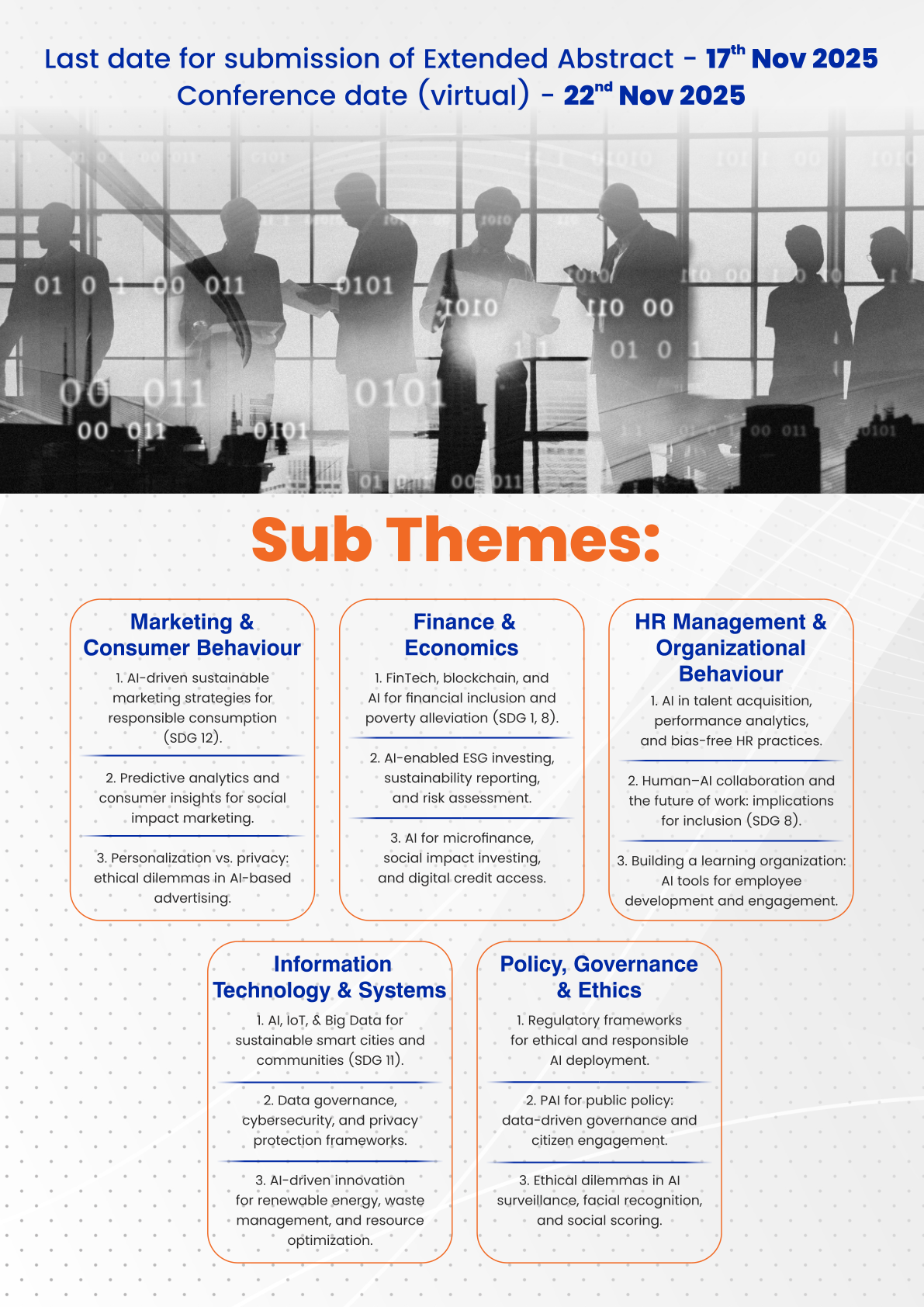
Last
date
for
submission
of
Extended
Abstract
-
17"
Nov
2025
Conference
date
(virtual)
-
22"
Nov
2025
Sub
Themes:
a
Marketing
&
>)
(~
Finance
&
>)
(HR
Management
&
Consumer
Behaviour
Economics
Organizational
1.
Al-driven
sustainable
1.
FinTech,
blockchain,
and
Behaviour
marketing
strategies
for
Al
for
financial
inclusion
and
Alin
talent
acquisition,
responsible
consumption
poverty
alleviation
(SDG
1,
8).
performance
analytics,
(spe
12).
eS
and
bias-free
HR
practices.
2.
Al-enabled
ESG
investing,
2.
Predictive
analytics
and
sustainability
reporting,
2.
Hunfan=Al
cdllaborationfand
consumer
insights
for
social
and
risk
assessment.
the
future
of
work:
implications
impact
marketing.
So
for
inclusion
(SDG
8).
3.
Al
for
microfinance,
os
3,
Personalization
vs.
privacy:
social
impact
investing,
3,
Building
a
learning
organization:
ethical
dilemmas
in
Al-based
and
digital
credit
access.
Al
tools
for
employee
\
advertising.
/
&
op
Nei
NGS
(~
Information
YN
1
Policy,
@arGuenee
|
Technology
&
Systems
&
Ethics
1.
Al,
loT,
&
Big
Data
for
1.
Regulatory
frameworks
sustainable
smart
cities
and
for
ethical
and
responsible
communities
(SDG
11).
Al
deployment.
2.
Data
governance,
2.
PAI
for
public
policy:
cybersecurity,
and
privacy
data-driven
governance
and
protection
frameworks.
citizen
engagement.
3.
Al-driven
innovation
3.
Ethical
dilemmas
in
Al
for
renewable
energy,
waste
surveillance,
facial
recognition,
management,
and
resource
and
social
scoring.
NG
optimization.
yy
XG
J)
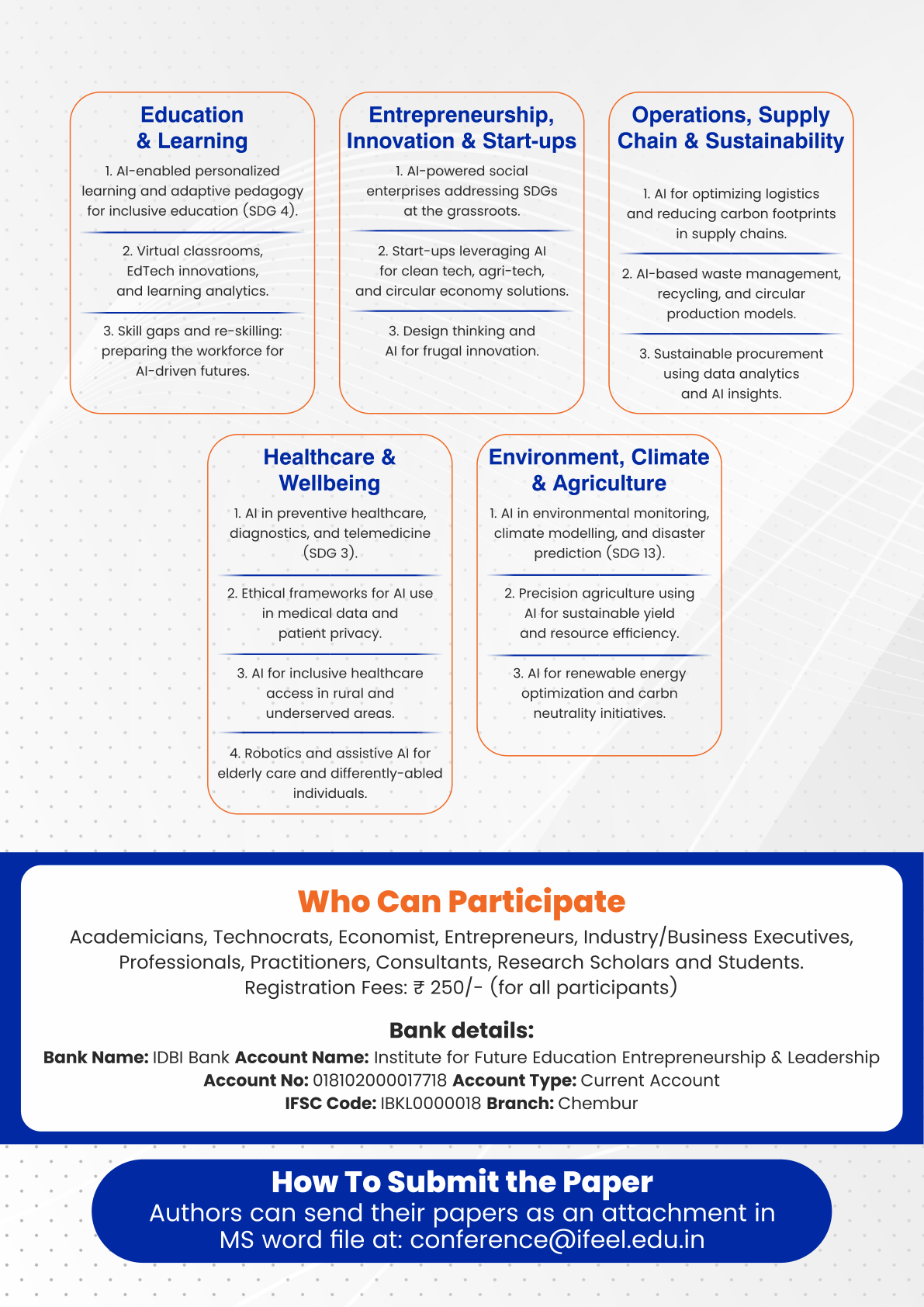
(—
Education
(
Entrepreneurship,
(a
Operations,
Supply
&
Learning
Innovation
&
Start-ups;
|
Chain
&
Sustainability
1.
Al-enabled
personalized
1.
Al-powered
social
learning
and
adaptive
pedagogy
enterprises
addressing
SDGs
1.
Al
for
optimizing
logistics
for
inclusive
education
(SDG
4).
at
the
grassroots.
and
reducing
carbon
footprints
~~
~=_
in
supply
chains.
2.
Virtual
classrooms,
2.
Start-ups
leveraging
Al
$$
$$$—$$$§_
EdTech
innovations,
for
clean
tech,
agri-tech,
2.
Al-based
waste
management,
and
learning
analytics.
and
circular
economy
solutions.
recycling,
and
circular
production
models.
3.
Skill
gaps
and
re-skilling:
3.
Design
thinking
and
preparing
the
workforce
for
Al
for
frugal
innovation.
3.
Sustainable
procurement
Al-driven
futures.
using
data
analytics
SG
J)
Ne
Be;
S&S
and
Al
insights.
a)
(-
Healthcare
&
>
Mentironniont!
Climate
)
Wellbeing
&
Agriculture
1.
Alin
preventive
healthcare,
1.
Alin
environmental
monitoring,
diagnostics,
and
telemedicine
climate
modelling,
and
disaster
(sDG
3).
prediction
(SDG
13).
2.
Ethical
frameworks
for
Al
use
2.
Precision
agriculture
using
in
medical
data
and
Al
for
sustainable
yield
patient
privacy.
and
resource
efficiency.
3.
Al
for
inclusive
healthcare
3.
Al
for
renewable
energy
access
in
rural
and
optimization
and
carbn
underserved
areas.
neutrality
initiatives.
4.
Robotics
and
assistive
Al
for
ae
TTY,
elderly
care
and
differently-abled
\
individuals.
]
ee
Who
Can
Participate
Academicians,
Technocrats,
Economist,
Entrepreneurs,
Industry/Business
Executives,
Professionals,
Practitioners,
Consultants,
Research
Scholars
and
Students.
Registration
Fees:
¢
250/-
(for
all
participants)
Bank
details:
Bank
Name:
IDBI
Bank
Account
Name:
Institute
for
Future
Education
Entrepreneurship
&
Leadership
Account
No:
018102000017718
Account
Type:
Current
Account
IFSC
Code:
IBKLO000018
Branch:
Chembur
How
To
Submit
the
Paper
Authors
can
send
their
papers
as
an
attachment
in
MS
word
file
at:
conference@ifeel.edu.in
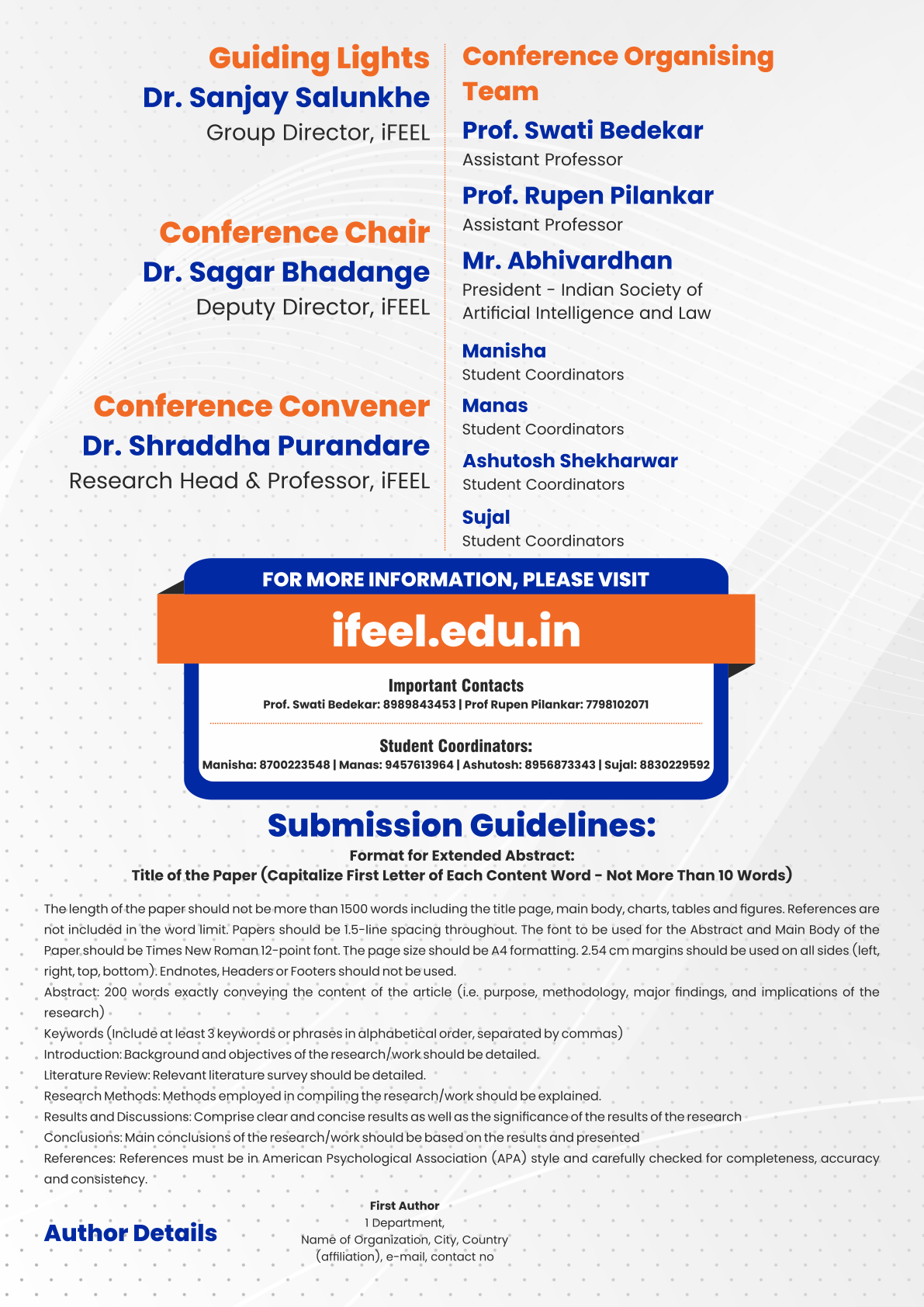
Guiding
Lights
Conference
Organising
Dr.
Sanjay
Salunkhe
Team
Group
Director,
iFEEL
Prof.
Swati
Bedekar
Assistant
Professor
Prof.
Rupen
Pilankar
Conference
Chair
Assistant
Professor
Dr.
Sagar
Bhadange
Mr.
Abhivardhan
.
President
-
Indian
Society
of
Deputy
Director,
iFEEL
artificial
intelligence
and
Law
Manisha
Student
Coordinators
Conference
Convener
Manas
Student
Coordinators
Dr.
Shraddha
Purandare
oy
tosh
shekharwar
Research
Head
&
Professor,
iFEEL
student
Coordinators
Sujal
Student
Coordinators
FOR
MORE
INFORMATION,
PLEASE
VISIT
ifeel.edu.in
Important
Contacts
Prof.
Swati
Bedekar:
8989843453
|
Prof
Rupen
7798102071
Student
Coordinators:
Manisha:
8700223548
|
Manas:
9457613964
|
Ashutosh:
8956873343
|
Sujal:
8830229592
Submission
Guidelines:
Format
for
Extended
Abstract:
Title
of
the
Paper
(Capitalize
First
Letter
of
Each
Content
Word
-
Not
More
Than
10
Words)
The
length
of
the
paper
should
not
be
more
than
1500
words
including
the
title
page,
main
body,
charts,
tables
and
figures.
References
are
Not
included
in
the
word
limit:
Papers
should
be
1.5-line
spacing
throughout.
The
font
to
be
used
for
the
Abstract
and
Main
Body
of
the
Paper.should
be
Times
New
Roman
12-point
font.
The
page
size
should
be
A4
formatting.
2.54
cm
margins
should
be
used
on
all
sides
(left,
right,
top,
bottom).
Endnotes,
Headers
or
Footers
should
not
be
used.
Abstract:
200
words
exactly
conveying
the
content
of
the
article
(ie.
purpose,
methodology,
major
findings,
and
implications
of
the
research)
Keywords
(Include
at
least
3
keywords
or
phrases
in
alphabetical
order,
separated
by
commas)
Introduction:
Background
and
objectives
of
the
research/work
should
be
detailed.
Literature
Review:
Relevant
literature
survey
should
be
detailed
Research
Methods:
Methods
employed
in
compiling
the
research/work
should
be
explained.
Results
and
Discussions:
Comprise
clear
and
concise
results
as
well
as
the
significance
of
the
results
of
the
research
Conclusions:
Main
conclusions
of
the
research/work
should
be
based
on
the
results
and
presented
References:
References
must
be
in
American
Psychological
Association
(APA)
style
and
carefully
checked
for
completeness,
accuracy.
and
consistency.
First
Author
1
Department,
Author
Details
Name
of
Organization,
City,
Country
(affiliation),
e-mail,
contact
no
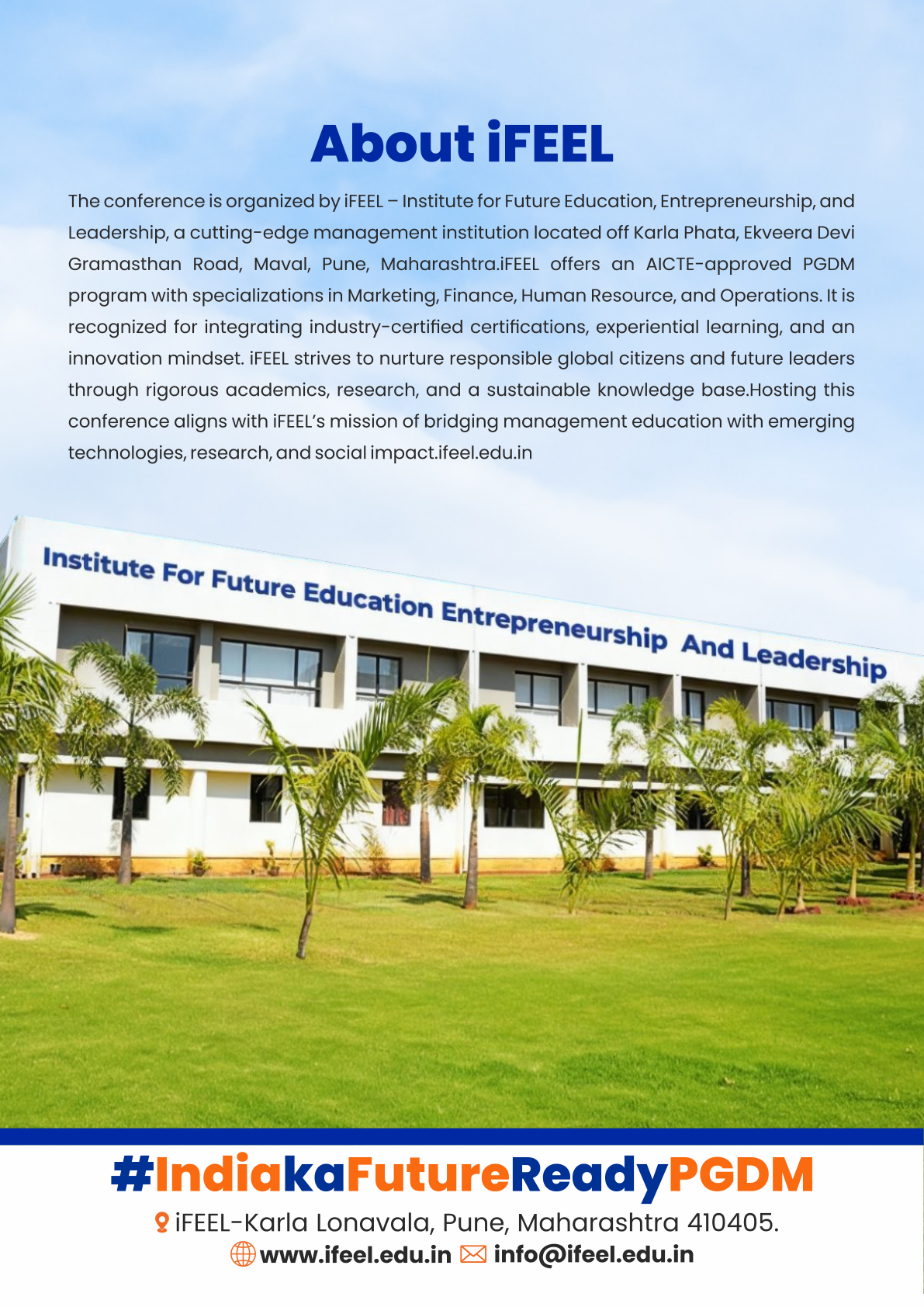
About
iFEEL
The
conference
is
organized
by
iFEEL
—
Institute
for
Future
Education,
Entrepreneurship,
and
Leadership,
a
cutting-edge
management
institution
located
off
Karla
Phata,
Ekveera
Devi
Gramasthan
Road,
Maval,
Pune,
Maharashtra.iFEEL
offers
an
AICTE-approved
PGDM
program
with
specializations
in
Marketing,
Finance,
Human
Resource,
and
Operations.
It
is
recognized
for
integrating
industry-certified
certifications,
experiential
learning,
and
an
innovation
mindset.
iFEEL
strives
to
nurture
responsible
global
citizens
and
future
leaders
through
rigorous
academics,
research,
and
a
sustainable
knowledge
base.Hosting
this
conference
aligns
with
iFEEL’s
mission
of
bridging
management
education
with
emerging
technologies,
research,
and
social
impact.ifeel.edu.in
#indiakaFutureReadyPGDM
Q
iFEEL-Karla
Lonavala,
Pune,
Maharashtra
410405.
©
www.
ifeel.edu.in
I
info@ifeel.edu.in
